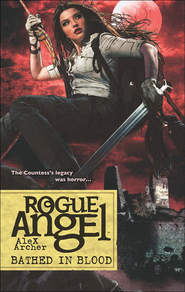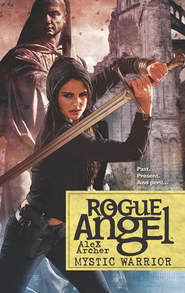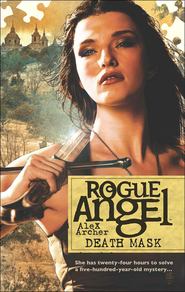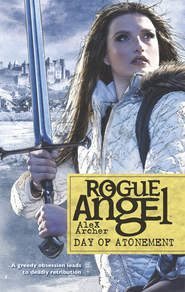По всем вопросам обращайтесь на: info@litportal.ru
(©) 2003-2025.
✖
The Mortality Principle
Автор
Год написания книги
2019
Настройки чтения
Размер шрифта
Высота строк
Поля
The first suit took that as his cue to drive home the obvious. “Meaning we can’t keep on throwing good money after bad. Chasing History’s Monsters is expensive for what it is. We could just as easily screen episodes we’ve got in the can in the same time slot, given there are almost one hundred now, or alternate them with stuff we can buy in from other networks that come with an established audience.”
“Are you canceling the show?” Annja asked, sensing where this was going.
“Not yet,” the suit said, dangling the threat of cancellation like the Sword of Damocles over her head. “But I guess you could say we’re putting you on notice. Things have to change.”
“Okay, so why am I here? What do you expect me to do?”
“We want you to justify the money the network is investing in you, Miss Creed,” the fourth and final suit said, speaking up for the first time.
He was the youngest of the four, Annja observed, no doubt fresh out of some Ivy League school with a point to prove—that point being to tear down everything that had been created and rebuild it from scratch, reinventing the proverbial wheel.
“We want you to prove to us you’re worth the long-term investment,” he went on, “meaning we want you to go out there and interact, hit the social networks, build up followers on Twitter, post compelling little Vine video hints about what’s coming up to lure people in, use hashtags to get people involved in your investigations, turn the viewers into your army of citizen archaeologists. Make them feel like they are part of the show.”
“How’s that supposed to work?”
“Well, one idea we’ve had is live broadcasts,” the woman said, leaning forward. “So they can tweet you with what they want to see happen when it comes to the hunt. Say you’re going after the Amber Room and there are three possible sites you’ve identified. They can vote which one you check out. Or maybe they can Tweet questions at you during live interviews, that kind of thing.”
“Do you have any idea just how bad an idea that is?” Annja said, shaking her head. She couldn’t quite believe what she was hearing.
“It doesn’t really matter what you think, Miss Creed. You either find a way to make this work, or you don’t. But if you don’t we’ll be forced to look at the alternatives. Tonight’s meeting was merely a courtesy. We wanted you to understand the orders weren’t coming from Mr. Morrell. He’s fought your corner passionately, but some things are bigger than a mere producer. They come down from on high. In this case, all the way from the top. From the owners themselves. As I said, I’m a huge admirer of yours, Miss Creed. For your sake, I can only hope you’ve got a truly gripping segment lined up.”
That had been a week ago. Now she was in Prague, unable to sleep, trying to work out how on earth she was going to make these changes work. Part of her wanted to ignore them and just turn in a segment like the hundred other segments she’d turned in, but she knew something like that would just rebound on Doug. It would have been different if it had only been her job on the line, but she wasn’t about to put his in jeopardy, not after hearing how he’d gone to bat for her against the suits. For all that they argued, she knew he was on her side deep down. It was just that sometimes those subterranean depths were somewhere near the earth’s core. She needed to map out a few prerecorded minutes, little minisegments to set up a bigger mystery that could go out live.
And that thought terrified her: a live feed going out to the world, warts and all, with so many variables she couldn’t possibly hope to control. It wasn’t just about veering off script, either. The suits wanted to set the lunatics loose to run the asylum. Somehow she needed to engineer it so they wound up making the choices she needed them to make, a bit like a magician onstage. It was all about direction and misdirection. Make the masses think you were giving them what they wanted, when really you were giving them what you wanted. Her head ached just thinking about it.
Annja’s laptop stood on the desk that doubled as a dressing table. The cursor flashed on a blank screen, taunting her. She’d read all the research she had brought with her a dozen times in the past week, and she’d spent days just wandering around the city, getting a feel for the place. The amount of information on the internet about the city was overwhelming. Even when she tried to narrow the search parameters, the amount of data she had to wade through was daunting. She kept finding references to the city being Hitler’s favorite, and how he’d preserved a lot of the Old Town because he wanted to keep it for himself. Every time she saw the same statement it was prefaced with the words little known fact despite that putting the words Hitler and Prague in Google returned several thousand identical little-known facts. For Annja, though, it was all about one thing, one story that had endured so much so it was part of the fabric of the city itself: the golem.
She’d sketched out brief notes covering myth behind the creation of the creature made of clay and given life by Rabbi Loew, but most of them were nineteenth century legends that claimed the Maharal—Loew—created the golem to defend Prague from anti-Semitic attacks back in the sixteenth century. Of course, now it was virtually impossible to tell how much truth was hidden within those sensationalized tales. As with most European legends, it didn’t take long to isolate the common elements. There were enough of them for her to be sure that they originated from the same source, no matter how fantastical they eventually became.
Of course, Annja was reasonably sure that what she was chasing this time was nothing more than a feat of deception that had fooled enough people when they needed to be fooled. Illusion was the simplest way to give birth to a legend. It wasn’t so different from the Hans Christian Andersen story of the emperor’s new clothes. You had this miraculous defender of the city only seen by some precious few, but then more and more accounts of sightings started to emerge, not because people had seen the golem but because no one wanted to be the odd one out.
However, given the additional pressure from on high, the piece on the golem was feeling like fluff, just a filler bit for the show, not an entire segment, and most certainly not enough to make it the focus of a live show. And being live, they wouldn’t be able to pad it with lots of shots of the city. Even if they could have, that would have made the episode about the city not the golem—hardly something that would satisfy the ad-revenue-hungry network executives.
Eventually she gave up staring at the screen and crawled into the uncomfortable bed, knowing she needed to grab some sleep if she was going to be good for anything in the morning. Coping with jet lag wasn’t the biggest problem, but even days after the event, being cooped up in a plane always left her feeling restless.
Her running shoes were still in the bottom of her case.
She was tempted to get up, get ready and go out for a run. She never felt more alive than when she was running, and these were new streets to pound. The problem was she wouldn’t be able to sleep after that. But maybe that was better than lying in the bed, restless?
Another noise from the street drew her attention.
It wasn’t the sound of the group of young men this time, nor was it a single drunk trying to find his way back home.
She recognized the sounds of violence for what they were. She heard a body fall and was at the window looking out into the near-darkness, unable to make out any sign of movement below. Annja threw the window open. There was nothing to hear but the distance rumble of traffic. No, she realized, under it she could barely make out the slap of a single pair of heavy footsteps moving away.
Whatever the argument had been, it was over quickly.
The question was how serious was it on a scale of licking wounds to bleeding out in a gutter?
In the week she’d been in Prague, she hadn’t had a reason to think of it as a violent city. Sure, its past was rooted firmly in revolution, but she didn’t think of any European city as being any worse than parts of New York or Chicago. That didn’t mean that violence didn’t exist here, just that tourists were kept away from it. Maybe it was the lack of gunfire, which seemed to provide a huge part of the New York night chorus, or the endless cycle of sirens that painted a sensory image of what a violent city ought to be like.
She waited at the window, listening, but heard neither so assumed the scrap had been fists not firearms.
The bedside clock flashed a few minutes shy of 3:00 a.m. Sleep still seemed a long way off. Annja turned on the radio, keeping the volume so low the half-whispered voice of the late-night DJ was so quiet it was impossible to tell what language he was speaking between the ripple of easy listening.
It was enough to lull her to sleep.
Annja woke to the sound of movement in the corridor outside her room.
The radio still provided its thin layer of background noise, but against the sounds of the waking hotel it was little more than a sibilant hiss. Her dreams had been filled with violence and fear. She knew logically there was nothing she could have done about the fighting in the street—it had been over before she was even aware of it—but that didn’t stop her subconscious mind from tormenting her with a guilt-tripped sleep.
She had no appetite for breakfast.
Annja showered, standing in the steaming hot spray long enough to turn her body a dark shade of pink, then wrapped a towel around herself and made a particularly foul cup of coffee from the selection of instant blends on offer. The heat alone was enough to make her feel more alive.
It was barely seven-thirty. If anything was going to revive her, it was the crisp morning air, which would only be clean and crisp for maybe another thirty minutes or so before the city filled with traffic.
Five minutes later she was stretching on the pavement, her hair pulled back in a still-damp ponytail.
She started to run, moving lightly on her feet, weaving a path through the narrow alleyways around the hotel, up beyond the corner that would have taken her over the Charles Bridge toward the palace on the hill, toward Wenceslas Square. Her muscles were tight, but as the blood started to flow they loosened up. Her breathing came in little wispy puffs of steam that corkscrewed up in front of her face.
In the distance Annja heard the sound of a siren approaching.
Without realizing it she was running toward the source of the previous night’s fight. Within the few minutes she’d been out, the streets had already begun to show increasing signs of life with café owners setting up the tables outside their windows. A newspaper vendor on the street corner beside the subway entrance was doing a brisk trade as people passed by in a rush to get to work. It was the kind of thing she saw in every street in every city. Every time she skirted that hubbub of life it reminded her how lucky she was not to be caught up in it. She couldn’t imagine drifting through life. Annja harbored no illusions just how lucky she was to live the life she did. That was just another reason why this live-broadcast Twitter-chasing plan made her so uncomfortable. She had secrets, just like everyone else. The idea of turning the world into citizen archaeologists and sending them out to chase monsters had the power to turn her life upside down.
She slowed as she reached the far end of the street. People had begun to gather, blocking the way.
One man stepped away from the group.
He pulled out his cell phone.
She was too far away to hear what the man said as he spoke into his phone, but his body language spoke volumes. He was calling the police.
At the sound of the approaching siren a few people peeled away from the crowd. They disappeared into the side streets and wider spaces beyond, happy not to be involved once the police arrived.
Annja stepped into a gap that had been created as a middle-aged woman stepped away. The woman’s rigid expression gave plenty warning of what she was about to see. A shiver raced up Annja’s spine as she peered through the cluster of bodies: a man in a blue suit crouched over someone lying on the ground in an alleyway that ran between two buildings. Annja saw the dark, damp patch staining the cobbles at his feet as she worked her way closer. The man was fighting for a life that wasn’t there to be saved. He stood and shook his head to no one in particular. There was nothing he could do. Nothing anyone could do. As he moved away to the fresher air of the street, Annja saw the body properly.
The victim had been dead for some time.
Four and a half hours, Annja thought, looking at the ragged clothes the body wore, and at the stains that had turned them the same dark color as the ground around the corpse.
Judging by the state of his clothes, there was every chance this usually quiet alleyway was where the dead man made his bed for the night. Could his death be the consequence of a fight over something as tragic as the meager shelter that the alleyway offered? If it was, then it was a poor way to end a life that had surely seen more than its fair share of troubles. Annja rubbed a hand through her damp hair. The body that lay in the narrow space was no longer a man; now it was evidence to be picked over in the mortuary.
It didn’t need a pathologist to read the crime scene. This wasn’t death by natural causes. There was nothing accidental about it. She’d been right the previous night; there had been violence in the air. She couldn’t have stopped it. She couldn’t even let herself think that way. The world wasn’t her responsibility. She couldn’t police every street and save every victim.
When the police car came to a halt only a few feet away from the crowd, the press of bodies miraculously thinned, gawkers suddenly remembering they had somewhere else to be. The man in the suit spoke to a policeman, no doubt explaining that he had found the dead man. Annja couldn’t understand the few words she caught. One policeman made a note in his small black book, presumably of the man’s name and address while the other worked his way through the remaining gawkers to the corpse. A few seconds later, after the briefest of glances at the dead vagrant, he began to usher everyone back.
The forlorn siren song of an approaching ambulance was wholly out of place and much too late, unless it was bringing a priest. By the look of the dead man, every last ounce of hope had been torn from him, shredded, before he had finally slumped to the ground and spilled what little was left of his bodily fluids out across the cobbles.











